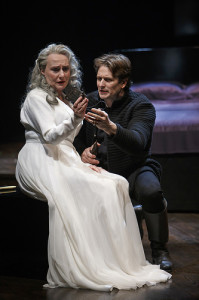Stratford’s Latest Hamlet Is a Triumph

STRATFORD, ONT. — We’ve arrived at one of the many great moments in Hamlet. It’s also an opportunity for us to take further measure of how actor Jonathan Goad is doing.
And now, we encounter a man possessed.
The playgoer always awaits this particular soliloquy with anticipation because it’s so important in defining the kind of Hamlet we’re experiencing. Goad, who has the title role in the Stratford Festival’s sterling new production of Shakespeare’s great tragedy, doesn’t disappoint. His explosion of rage and anguish sweeps through the theatre like a flame.
But there’s more than anger here. There’s something unnerving about the way this turbulent prince inveighs against the “remorseless, treacherous, lecherous, kindless” villainy of the uncle who has murdered his father and married his mother. If he could smash the Festival Theatre stage apart with his fists, he probably would.
However that’s not all there is to this Hamlet. Complete loss of control does come close during these moments — but it doesn’t actually happen. If — as Laurence Olivier and many others have asserted — Hamlet is the tragedy of a man who can’t make up his mind, that may be because of those recurring glimpses, beneath the histrionics, of a sensitive and self-inquiring mind. Is there also self-loathing? Perhaps. But we must be careful here. Goad’s multi-faceted reading also seems tinged with a knowing, sardonic despair. Is this Hamlet signalling his suspicion that he’s a mere plaything of the gods, the victim of some ghastly cosmic joke? The riddle persists and tantalizes
Whatever the case, Goad’s Hamlet would be an unsettling presence in anyone’s court. He makes it all so very, very personal. That’s important. Indeed, the threat of Fortinbras and a Norwegian invasion seems somewhat remote and inconsequential in the world laid out in Antoni Cimolino’s gripping production. The vaguely Ruritanian setting supplied by Cimolino and designer Teresa Przybylski helps make the play seem more accessible, reminding us that the kind of psychological carnage that rages through Shakespeare’s play can be as much part of the human experience today as it was centuries ago. But within this context, larger affairs of state scarcely seem to matter in a treatment that seems most intent on delivering a domestic horror story of often painful intimacy. Indeed, lighting designer Michael Walton frequently encloses it in a shroud of darkness that increases the claustrophobia.
This is probably as good a Hamlet as we’ve seen at Stratford for several decades. The eerie opening scene, at night on the battlements, with soldiers nervously awaiting the arrival of a ghostly presence, establishes a dramatic urgency that continues to the play’s grisly end. The Festival Theatre may seat 1800, but you wouldn’t know it. Cimolino, who has himself acted on in its famous stage, knows how to draw the audience into its seductive embrace. This is a production of genuine narrative clarity, but it also has a rare immediacy that brings this dysfunctional household into sharp and arresting focus.
So we have excitement in spades from this Hamlet. But for the viewer there’s also the also satisfaction of watching superb ensemble work that serves both the sense and sensibility of the material. Psychologically, Cimolino and his players have made choices that give this production its peculiarly hothouse quality and heightens its atmosphere of secrets and lies.
Hence, we have an outstanding Geraint Wyn Davies, oozing hypocrisy and insincerity as the usurping and murderous Claudius. He could as easily be the shady chairman of the board, relying on macho swagger and phoney bonhomie to sustain his position — but we sense the rot beneath the shallow posturing. And has Stratford ever seen a better or more surprising Gertrude than in the weariness of the soul that so affectingly emerges in Seana McKenna’s performance?
The memorable roll call continues. Tom Rooney’s Polonius is brilliant — in no way the doddering buffoon we often get. Garrulous, yes. Pedantic, yes. But also the shrewd and caring elder statesman whose death becomes an awful absurdity. As Ophelia, an excellent Adrienne Gould brings a quiet vulnerability to her early scenes before unleashing a mad scene that is hair-raising in its raw display of unfettered sexual rage.
As Laertes, Mike Shara makes Ophelia’s grieving sibling into something more than just an impetuous hothead, and his climactic duel with Hamlet is stunning. Company stalwarts Robert King and Brian Tree strike their own caustically comic chords as the gravediggers, Tim Campbell is an earnest and touching Horatio, Sanjay Talwar and Steve Ross an appropriate pair of ninnies as Rosencrantz and Guildenstern, and Juan Chioran a striking Player King.
As for the character of Hamlet — well, Matthew Arnold once wrote something about the pressures of a thousand subtle influences, both physiological and psychological, on Shakespeare’s tormented hero. It’s a testament to Jonathan Goad’s performance that he keeps astonishing us again and again.
(Hamlet continues to Oct. 11. Ticket information at 1 800 567 1600 or stratfordfestival.ca)